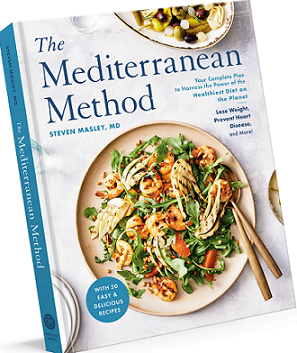Even though we can prevent 90% of heart disease with lifestyle, heart attacks and strokes remain the #1 killer for both women and men in the US, Canada, and most of the western world.
Several lifestyle factors play a critical role, including exercise, sleep, stress management, and avoiding tobacco use, but the biggest factor that impacts our heart is the food we eat day after day.
Low-fat diets have faded in popularity for over a decade and recent studies have shown that they can worsen blood sugar control and cholesterol profiles, even increasing your risk for heart disease.
More recently, Paleo and low-carb diets have been more popular, yet they are hard to follow long term, and tend to limit the critical antioxidant nutrients that come from eating an abundance of fruits and vegetables, which is critical for long-term heart health.
The good news is that the best-studied, most effective, and easiest to follow eating plan that protects your heart is a Mediterranean diet. It features vegetables, fruits, beans, nuts, seafood, olive oil, a variety of spices and herbs, and modest amounts of organic/free-range poultry, eggs, and dairy, and red wine. The meals prepared with these foods are easy to make and delicious, making this type of diet easy to stick with long term.
And, if we combine a Mediterranean diet with low-glycemic load content, the results are even better.
The EPIC Greek Cohort Study, published in 2012 with nearly 24,000 participants, evaluated adherence to a Mediterranean eating plan for more than 10 years in relation to heart attacks and strokes. Researchers also compared glycemic load with detailed dietary histories in all these patients. Those with the highest adherence to the Mediterranean diet and lowest glycemic load scores had the lowest rate of CVD (heart attacks and strokes) events. And, if these individuals were overweight or obese, the benefits from following a Mediterranean diet combined with low glycemic load was even stronger.
Not only is a Mediterranean diet good for your heart, but in the famous PREDIMED study, they showed that following it can also improve your brain function and help prevent memory loss. The combination of a Mediterranean eating plan and low glycemic  load is also highly beneficial for your brain.
load is also highly beneficial for your brain.
The key to reducing glycemic load with a Mediterranean diet is to avoid sugar and flour, which with a Mediterranean diet is easy to do. That basically means avoiding bread, cereal, and pizza, plus eating fresh fruit for dessert. If you serve pasta on occasion, keep the pasta portion small and ideally buy the newer protein-enriched, low-carb pasta (such as the brand Barilla), which is commonly now available.
To get you started on a low-glycemic version of a Mediterranean eating plan, I highly recommend my newest book, The Mediterranean Method, which includes 50 of my favorite recipes with color photos. If you order now, as a bonus, you will receive my Mediterranean Method Cooking Class Videos featuring selected recipes from the book. These cooking classes provide my best tips for creating beautiful, delicious, and easy-to-prepare Mediterranean meals. Click here, to order the book and get my FREE cooking classes.
I wish you the very best of health!
Steven Masley, MD, FAHA, FACN, CNS
Please share these blogs with your friends and family!
Send them this link to sign-up to receive my blog posts: www.drmasley.com/

Miracle Noodles are even better than Barilla because they have way less carbs in them.
Suzanne,
I have never seen them in a store, but I will look for them. Thanks for the tip.
Steven Masley, MD